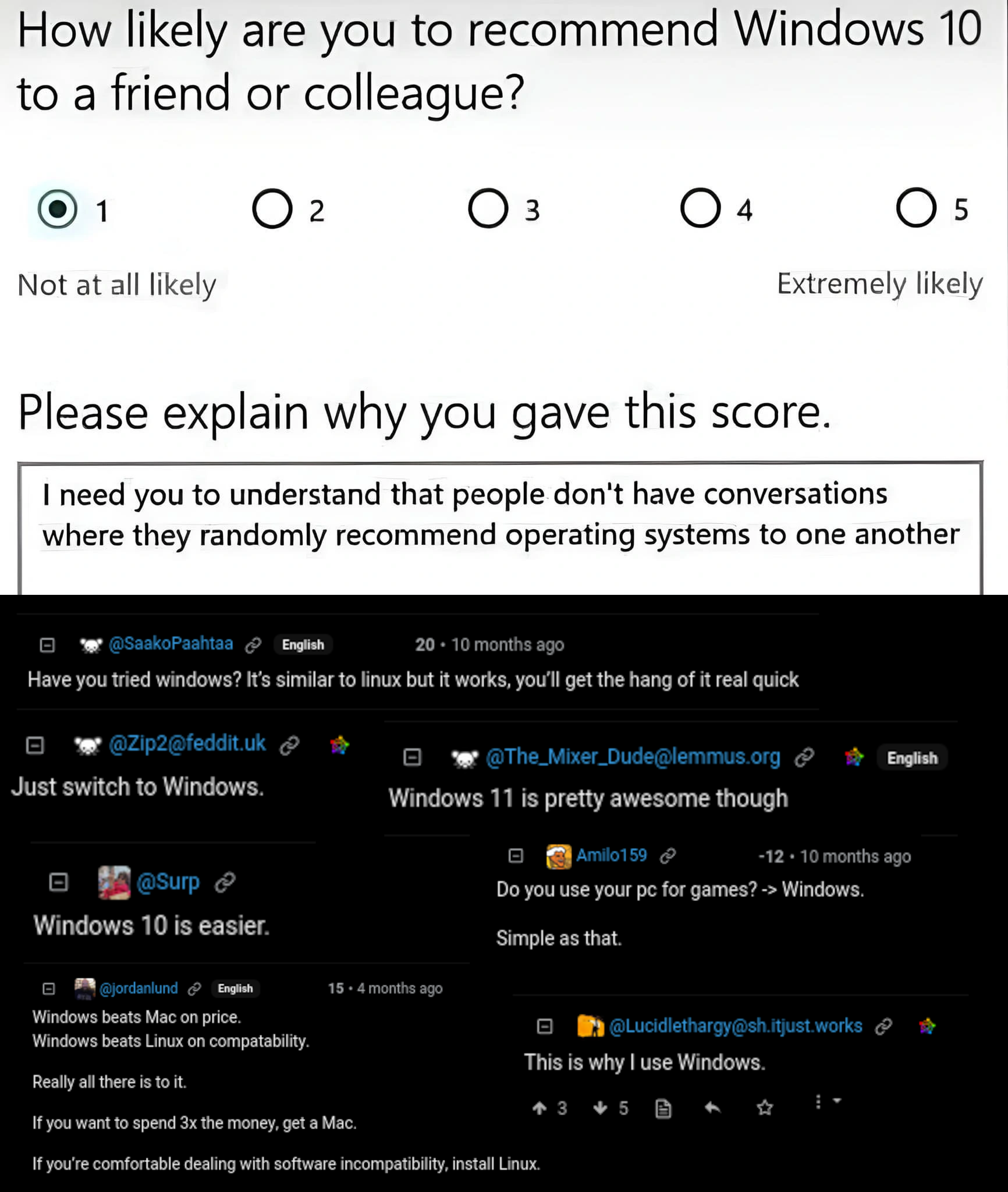Out of curiosity, why exactly do you not have a choice in not running systemd? Is it company policy / are they clients’ machines?
- 3 Posts
- 17 Comments
I’m more of a runit guy, but I started using Alpine recently, and I have to say, openrc is also pretty nice!
Fstab is for critical partitions
Hush everyone, don’t tell this guy about
noauto, it’ll burst his bubble
I’ve gotten into quite a lot of systemd-related flame wars so far, and what strikes me is that I haven’t heard a single reason why systemd is good and should be used in favor of openrc/sysvinit/whatever. The only arguments I hear in favor of systemd, even from the its diehard defenders, are justifications why it’s not that bad. Not once have I heard someone advocate for systemd with reasoning that goes likes “Systemd is superior to legacy init systems because you can do X much easier” or “systemd is more secure because it’s resistant against Y attack vector”. It’s always “Linus says it’s allright” or “binary logfiles aren’t a problem, you can just get them from journald instead of reading the file”, or “everyone already uses it”.
When it comes to online discourse, systemd doesn’t have advocates, it has apologists.
Why is the daemon smoking? Are they taking a break from their duties? Is this what happens when I run
rc-service sshd stop?
After the latest bullshit from Microsoft
I like how your comment works regardless of whether you consider “latest” to be the past year or the past decade lol.
He really insists on debian-based, I don’t really know why. And, while Void IS really solid, it isn’t exactly known for the most expansive package collection. Xournal, for example, is not available through XBPS (there is a xournal package, but it just installs xournal++), which is one of the programs he likes a lot. I told him it’s on nix, but he doesn’t want to use nix.
But I agree, Void is amazing, I use it on my laptop. One little-known cool feature of Void is that its official docker images come in
busybox/musl libc,busybox/glibc, andcoreutils/glibcvariants, it gives you a nice scale from most minimalist to most compatible.
I like your comment a lot because you can substitute a lot of different things for “snap” and it still ends up sounding like a very reasonable opinion
I feel like I would be more okay with leaded gasoline if it didn’t still have a lot of very real flaws.
I feel like I would be more okay with anarcho-capitalism if it didn’t still have a lot of very real flaws.
I feel like I would be more okay with PFAS-coated cookware if it didn’t still have a lot of very real flaws.
I feel like I would be more okay with single-use plastic bags if it didn’t still have a lot of very real flaws.
I feel like I would be more okay with cryptocurrencies if it didn’t still have a lot of very real flaws.
I feel like I would be more okay with generative AI if it didn’t still have a lot of very real flaws.
I feel like I would be more okay with eating highly processed meat if it didn’t still have a lot of very real flaws.

You are about to do something potentially harmful.
To continue type in the phrase ‘Yes, do as I say!’But speaking seriously, I think he tried it for a while and didn’t like it either… not sure why specifically tho, I’ll ask him
It’s not a miniscule gripe tho. Snap is still broken for many users, and relying on it for something as critical as a web browser is asking for trouble. Experimental technologies like snap should be opt-in for users who are willing to deal with the issues they create. Do they really expect a novice to see firefox’s filepicker not behaving correctly, and think “Aha, an XDG desktop portal issue! Let me drop everything I’m doing and go troubleshoot that” ? Ubuntu is meant to be linux for normies, they don’t have the time or the knowledge to deal with snap.
Next step is probably a VM…
Boy, you’re gonna love QubesOS
One of my friends spent like a month distrohopping just to find a debian-based distro that fits these two criteria:
-
First-class support for KDE
-
Isn’t broken all the time
Ubuntu fails both. KDE Neon excels on the first one, but fails harder than ubuntu on the second one. Kubuntu as well. Debian has horridly outdated packages, and he refuses to use nix/flatpak. Tuxedo OS is obscure and broken. Mint is great, but installing KDE takes some effort.
He finally settled on Ubuntu Server with the native KDE package. Still has to do some weird incantations to banish snap tho.
How did things get this bad?
-

 0·18 days ago
0·18 days agoGet two birds stoned at once!!

 0·18 days ago
0·18 days agoDon’t forget Microshit’s renowned Orifice software suite!

 0·18 days ago
0·18 days agoUnpopular opinion: dead internet is not only real, but GOOD. Once robots get good enough to autonomously sign up for websites and make convincing posts, this will force us humans to go actually outside, make friends, form deep social relationship, and build lasting, resilient communities. Meanwhile on the internet, websites that are willing to allow AI content for money will eventually die out due to lack of actual users. The only remaining websites will be run by individuals and organizations with non-profit motives, and a strict human-only policy with verification based on word-of-mouth / invite system.



(Jokes aside, I’m glad you liked/hated my meme enough to make an edit :-) )